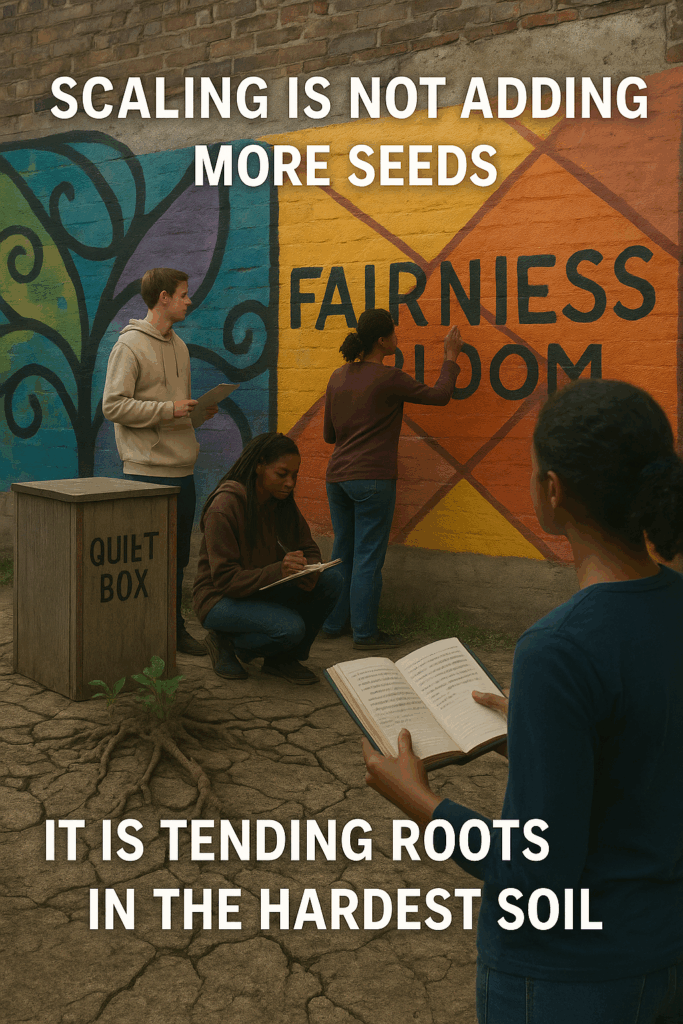
The council chamber smelled faintly of paper and polish, its polished wood and high ceilings imposing in ways that pressed on Emil’s chest. At the long table, Councilor Reyes adjusted her glasses, a stack of documents at her side. Hargrove sat stiffly beside her, pen tapping like a gavel. Behind them, aides whispered, while Marco leaned casually in a corner, his smile sharpened into quiet provocation.
Priya clutched the proposal packet, its pages marked with costs, timelines, and photos of murals, canopies, and quiet boxes. Aisha shifted from foot to foot, her paint-streaked sleeves a splash of rebellion against the chamber’s formality. Jaden’s welder’s apron smelled faintly of iron, and Mina held her wooden ledger box like a shield.
Reyes’s voice rang clear:
“Young people, your Circle has presented a creative plan. Ten pilot neighborhoods, $1,000 budget, safeguards against misuse. It is impressive—but words on paper are not roots. We cannot fund an idea untested. So here is our counter: prove it. We will select a neighborhood for you—one fractured by mistrust, hardened by cycles of violence. If your Accord holds there, you may have your forest.”
She glanced at Hargrove, who added dryly:
“East Riverton. Gangs, vandalism, dropouts. Schools call it a lost cause. If your seed survives there, perhaps we’ll believe it can survive anywhere.”
Mina’s fingers tightened on her box. Aisha’s jaw set. Emil felt the basil leaf in his pocket, Grandfather’s words echoing: “Branches cannot outpace roots. When they do, the storm topples the tree.”
Marco’s voice slithered from the corner.
“Or maybe the seed just withers in real soil. Be careful what you ask for.”
Priya’s eyes narrowed, but she didn’t respond. Instead, she stepped forward, placing the ledger on the table with deliberate care.
“Then East Riverton will be our soil. We don’t fear cracks—we plant in them.”
East Riverton
The neighborhood’s walls bore scars of graffiti, slogans clashing in red and black. Windows were barred, alleys whispered with caution. When the Circle arrived, kids lingered on corners, wary, laughing at their clipboards and boxes.
A boy shouted, “Ledger? You mean snitch book?” Laughter rippled. A mural board they set against a wall was nearly toppled within minutes.
Jaden muttered, “Feels like Marco’s whispers, only louder.”
Aisha lifted her brush, streaking a bold line across the board. “Then let’s make louder roots.” She painted LISTEN FIRST in bright blue, then stepped back. “Who wants to paint their side?”
At first, no one moved. Then a girl in a red hoodie added the word HOME. Another scrawled TRUST? with a question mark so large it cut across the crack in the wall.
Mina quietly placed her box on a table, lining it with cloth. She whispered to a nearby group of kids, “No names, no copies. Pull your words out anytime.” One boy sneered but scribbled something, shoving it in quickly.
Emil called for a three-minute circle. The first voices came harsh, jagged:
“They shut our rec center.”
“Cops treat us like criminals.”
“Council just cuts us off.”
But as the minutes passed, something shifted. A girl’s voice cracked: “I just want to walk home safe.” Silence followed—then nods.
By sunset, the mural was covered in clashing colors: fists, bridges, hearts, question marks. The quiet box had ten slips inside. It wasn’t peace—but it was a start.
Back at the Greenhouse
That night, under the hum of the sensors, the Circle gathered. Aisha spread the mural photos on the table. Mina opened the box—ten slips of raw truth:
-
“We’re tired of being called gangs.”
-
“I want my brother to come back from juvie.”
-
“Trust feels fake.”
-
“We need a place that’s ours.”
Priya read them aloud, her voice steady. Emil leaned back, feeling both the fragility and the fire of what they had planted.
“They didn’t laugh us out,” Jaden said. “That’s more than I expected.”
“They painted with us,” Aisha added. “Even if the lines were angry.”
Mina whispered, “But the soil’s still cracked. They don’t trust easily.”
Emil looked at the ledger, his hand hovering over the pen. “And that’s the test. Scaling isn’t adding more seeds—it’s tending the hardest soil first.”
Ledger Entry — The Test of Scale
Date: October 10
Symptom: Scaling trust faces resistance—council demands proof, neighborhoods distrust motives.
Disease — The Four Absences (Scaling):
-
Absence 1 (Exclusion): Limited resources lock out neighborhoods, as if only some deserve to be heard.
-
Absence 2 (Vengeance): Whispers punish openness—“snitch book,” “trap”—echoing Marco’s fear-mongering.
-
Absence 3 (Dehumanization): Youth dismissed as “gangs” or “naive,” their capacity erased.
-
Absence 4 (Unheard Cry): Needs for safety, belonging, and dignity ignored amid skepticism.
Investigator’s Response: Planted in East Riverton—mural boards, quiet boxes, three-minute circles. Heard raw truths: anger, mistrust, but also longing for safety and belonging.
Outcome: Fragile sprouts in hostile soil—ten entries, a painted wall, voices that had long been silent now written. A fragile proof, but a living one.
Note: Scaling is not numbers. It is roots tested in the hardest ground. If sprouts can rise here, a forest may yet grow.

